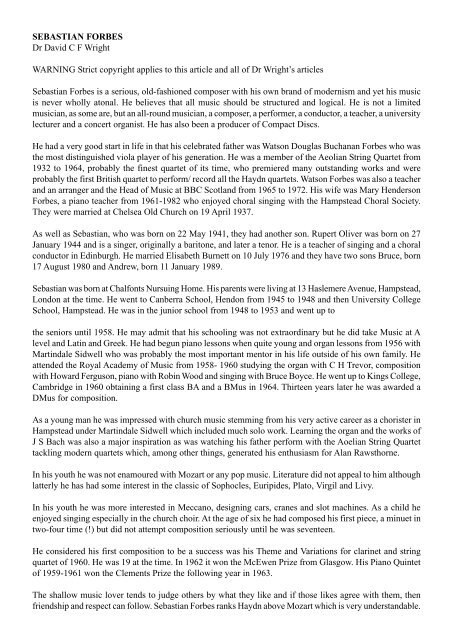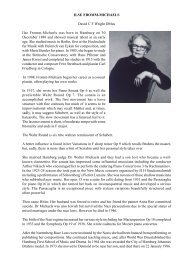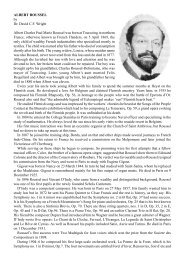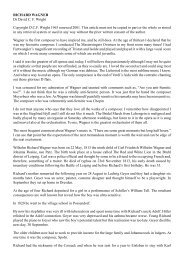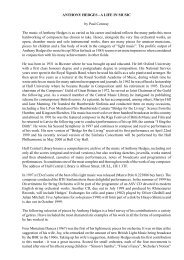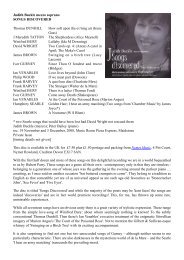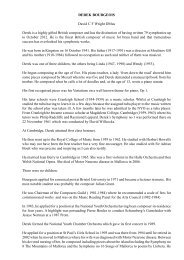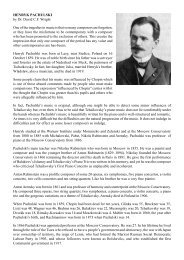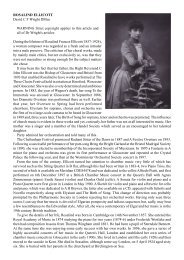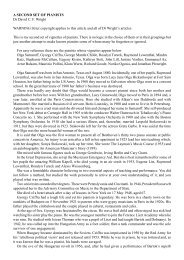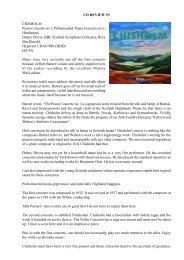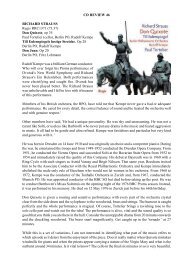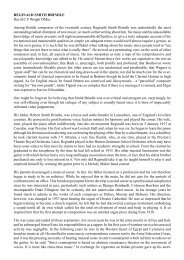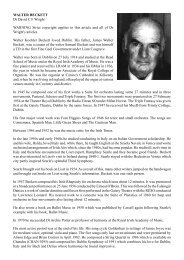Sebastian Forbes - Dr David Wright
Sebastian Forbes - Dr David Wright
Sebastian Forbes - Dr David Wright
You also want an ePaper? Increase the reach of your titles
YUMPU automatically turns print PDFs into web optimized ePapers that Google loves.
SEBASTIAN FORBES<br />
<strong>Dr</strong> <strong>David</strong> C F <strong>Wright</strong><br />
WARNING Strict copyright applies to this article and all of <strong>Dr</strong> <strong>Wright</strong>’s articles<br />
<strong>Sebastian</strong> <strong>Forbes</strong> is a serious, old-fashioned composer with his own brand of modernism and yet his music<br />
is never wholly atonal. He believes that all music should be structured and logical. He is not a limited<br />
musician, as some are, but an all-round musician, a composer, a performer, a conductor, a teacher, a university<br />
lecturer and a concert organist. He has also been a producer of Compact Discs.<br />
He had a very good start in life in that his celebrated father was Watson Douglas Buchanan <strong>Forbes</strong> who was<br />
the most distinguished viola player of his generation. He was a member of the Aeolian String Quartet from<br />
1932 to 1964, probably the finest quartet of its time, who premiered many outstanding works and were<br />
probably the first British quartet to perform/ record all the Haydn quartets. Watson <strong>Forbes</strong> was also a teacher<br />
and an arranger and the Head of Music at BBC Scotland from 1965 to 1972. His wife was Mary Henderson<br />
<strong>Forbes</strong>, a piano teacher from 1961-1982 who enjoyed choral singing with the Hampstead Choral Society.<br />
They were married at Chelsea Old Church on 19 April 1937.<br />
As well as <strong>Sebastian</strong>, who was born on 22 May 1941, they had another son. Rupert Oliver was born on 27<br />
January 1944 and is a singer, originally a baritone, and later a tenor. He is a teacher of singing and a choral<br />
conductor in Edinburgh. He married Elisabeth Burnett on 10 July 1976 and they have two sons Bruce, born<br />
17 August 1980 and Andrew, born 11 January 1989.<br />
<strong>Sebastian</strong> was born at Chalfonts Nursuing Home. His parents were living at 13 Haslemere Avenue, Hampstead,<br />
London at the time. He went to Canberra School, Hendon from 1945 to 1948 and then University College<br />
School, Hampstead. He was in the junior school from 1948 to 1953 and went up to<br />
the seniors until 1958. He may admit that his schooling was not extraordinary but he did take Music at A<br />
level and Latin and Greek. He had begun piano lessons when quite young and organ lessons from 1956 with<br />
Martindale Sidwell who was probably the most important mentor in his life outside of his own family. He<br />
attended the Royal Academy of Music from 1958- 1960 studying the organ with C H Trevor, composition<br />
with Howard Ferguson, piano with Robin Wood and singing with Bruce Boyce. He went up to Kings College,<br />
Cambridge in 1960 obtaining a first class BA and a BMus in 1964. Thirteen years later he was awarded a<br />
DMus for composition.<br />
As a young man he was impressed with church music stemming from his very active career as a chorister in<br />
Hampstead under Martindale Sidwell which included much solo work. Learning the organ and the works of<br />
J S Bach was also a major inspiration as was watching his father perform with the Aoelian String Quartet<br />
tackling modern quartets which, among other things, generated his enthusiasm for Alan Rawsthorne.<br />
In his youth he was not enamoured with Mozart or any pop music. Literature did not appeal to him although<br />
latterly he has had some interest in the classic of Sophocles, Euripides, Plato, Virgil and Livy.<br />
In his youth he was more interested in Meccano, designing cars, cranes and slot machines. As a child he<br />
enjoyed singing especially in the church choir. At the age of six he had composed his first piece, a minuet in<br />
two-four time (!) but did not attempt composition seriously until he was seventeen.<br />
He considered his first composition to be a success was his Theme and Variations for clarinet and string<br />
quartet of 1960. He was 19 at the time. In 1962 it won the McEwen Prize from Glasgow. His Piano Quintet<br />
of 1959-1961 won the Clements Prize the following year in 1963.<br />
The shallow music lover tends to judge others by what they like and if those likes agree with them, then<br />
friendship and respect can follow. <strong>Sebastian</strong> <strong>Forbes</strong> ranks Haydn above Mozart which is very understandable.
He prefers late Schubert having conducted his symphonies numbers 7, 8, in the four movement version, and<br />
number 10. He considers Beethoven’s chamber music and his last quartets to be his best work but admits that<br />
Brahms is his favourite which is, in itself, very refreshing to hear, as Brahms is unfairly maligned. His<br />
chamber music and choral music particularly the vocal quartets with piano he regards highly stating that<br />
these are under-rated areas of his output. Sadly, he finds Liszt boring apart from the impressive Piano Sonata.<br />
Mahler probes the spirit and he is a composer who admits his inner conflicts. The first movement of the<br />
Symphony no. 9 is greatly appreciated. Although Mr <strong>Forbes</strong> has performed Britten he is not gripped by his<br />
music. As for Tippett he can only find some affinity with the Piano Sonata no. 2. He selects some works of<br />
Ligeti as having much merit.<br />
He is refreshingly honest. Take, for example, his comments about the symphony. It is not dead but composers<br />
today shun both the narrative and the structural requirements which are essential ingredients of the symphony.<br />
There are many works called symphony which are not symphonies at all.<br />
His views on aleatory music are significant. He explains that recitatives in Monteverdi or Bach have elements<br />
of aleatorism and this is recognisable and accepted. But to the uninformed or misinformed music lover this<br />
is not a problem and yet modern composers who use aleatoric methods, perhaps in extended form, are not so<br />
accepted. Examples of extreme freedom as one finds, for example, in Stockhausen are termed as unacceptable.<br />
Serial music cannot be the subject of generalisation. As Mr <strong>Forbes</strong> points out, no work is great because it is<br />
serial or not serial. And people like Michael Kennedy are hopelessly wrong when they call serial music a<br />
scheme or a style.<br />
To quote Mr <strong>Forbes</strong> again, “ The role of a composer is to be genuinely creative and search for his own<br />
message and present it as he thinks best… never mind if nobody wants it!”<br />
To return to his own work. After the two prize winning pieces already mentioned his true voice emerges in<br />
the orchestral suite Pageant of Paul of 1962-3, the Concertante for clarinet, bassoon, violin, viola and piano<br />
of 1963, and the Four Songs for mezzo, violin and piano of 1963<br />
The first work that Mr <strong>Forbes</strong> values highly is his Piano Trio of 1964.<br />
In the autumn of 1964 he taught at the Royal College of Music one day a week with giving 21 students each<br />
20 minutes on harmony. On the following day he gave organ lessons at St Marks and St Johns in Chelsea and<br />
trained and conducted the choir at St Andrews, Kingsbury between September 1964 and August 1965. He<br />
joined the BBC as a producer in December 1964 where he stayed until June 1966 but continued part time<br />
until February 1967. During this time he was the producer of a series of 36 programmes about British<br />
cathedrals and their music, in which John Betjeman played the part of the visitor to each cathedral. Some<br />
programmes were later released on LPs.<br />
From April 1966 <strong>Sebastian</strong> <strong>Forbes</strong> was the organist at S Giles, Cripplegate which stood in several acres of<br />
bomb sites. He founded the Aeolian Singers and was the first to record all the Bach motets which he paid for<br />
out of his own pocket borrowing money from his bank. He advised on the restoration and rebuilding of St<br />
Giles’ organ.<br />
By 1967 he was freelancing, but from January 1968 to the following September he was a Trinity College as<br />
a lecturer and was also the college organist. Then he went up to Bangor University as a teacher of composition,<br />
20th century analysis and conducted the Seirlon Singers.<br />
He married in 1968 and has two children from that marriage. Joanna was born on 5 December 1971 and was<br />
a singer with the Swingle Singers for six and a half years. She married Alexander L’Estrange, a jazz composer,<br />
and they have a son Toby born in 2006. The second <strong>Forbes</strong> child is Emily who achieved a Doctor of Philosophy<br />
at Oxford and is a social researcher. She married Rob Tanner, another DPhil, and he teaches physics at St<br />
Albans school. They have a son, Aidan.
The year 1968 was also the year of Mr <strong>Forbes</strong>’ Gracious Spirit for choir and organ which has received much<br />
acclaim from the public.<br />
In 1970 Reginald Smith Brindle left Bangor to take up a post at the University of Surrey. He was replaced by<br />
William Mathias who was in the Elgarian mould of being bossy, lazy and very self-important. A meeting<br />
with Smith Brindle lead to Mr <strong>Forbes</strong> being tempted to join the University of Surrey in 1972. Smith Brindle,<br />
in his usual slow speaking voice, said, “We need some young blood!”<br />
And so <strong>Sebastian</strong> <strong>Forbes</strong> went there in 1972 teaching many aspects of music, 20th century analysis, training<br />
students for BMus and developing new modules. He also conducted the choir and orchestra. He retired in<br />
the summer of 2006.<br />
Sadly, <strong>Sebastian</strong> <strong>Forbes</strong>’s first marriage was dissolved in 1977. In 1983 he married his second wife Tessa<br />
Brady and they have two children. Alastair was born on 11 October 1984 and studied music technology.<br />
Nicola was born on 9 September 1986 and read English at Exeter.<br />
It was while Mr <strong>Forbes</strong> was at the University of Surrey that both his parents died within four years of each<br />
other.. His father died on 25 June 1993 and his mother on 4 January 1997. They were a tremendous influence<br />
in his life and I am one of the many who admired the Aeolian Quartet who introduced me to many works. I<br />
had a brief but happy relationship with their cellist Derek Simpson who married another cellist, Fiona Cameron,<br />
and they had three children, one of whom was killed in an accident. When Watson <strong>Forbes</strong> retired from the<br />
Aeolian his place was taken by Margaret Major.<br />
It appears that Mr <strong>Forbes</strong> is not a self-promoter but he is another example of a good composer whose music<br />
seems to languish in near oblivion.<br />
Copyright <strong>David</strong> C F <strong>Wright</strong> 2005. This article, or any part of it, however small, must not be used,<br />
copied, stored in any mechanical or retrieval system, downloaded or reproduced in any form without<br />
the prior written comsent of the author. Failure to comple is illegal being theft and is in breach of<br />
International Copytight Law and will render any offender liable to ction at law.


